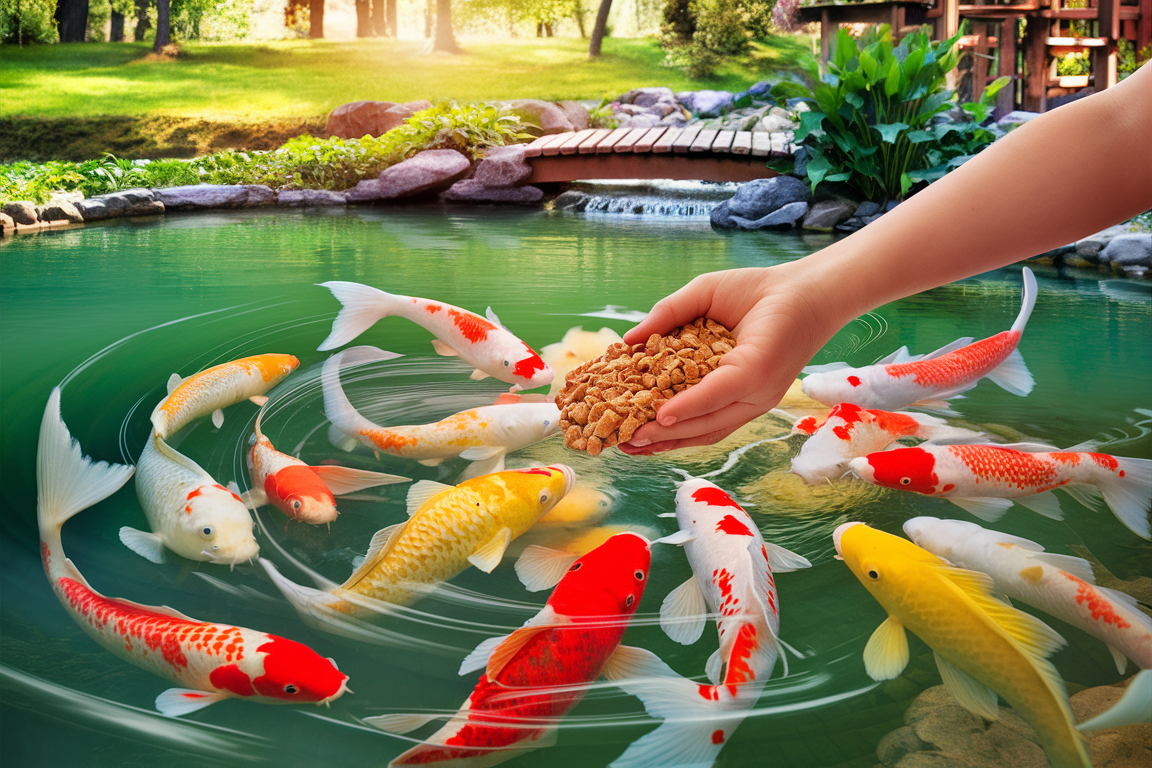Introduction: Finding the Right Feeding Schedule for Your Koi
Feeding your koi fish is a crucial aspect of responsible pond ownership. Just like any pet, koi need a balanced diet to stay healthy, vibrant, and full of life. But how often to feed koi fish? At Love My Koi, we believe in providing the best possible care for these beautiful creatures, and that includes understanding their dietary needs.

Understanding Koi Feeding Basics
The Importance of a Balanced Diet
Koi are omnivores, meaning they eat both plants and animals. A balanced diet for koi should include:
- High-quality koi pellets: These pellets are specially formulated to provide the nutrients your koi need for optimal growth and health.
- Live foods: Live foods, such as brine shrimp, bloodworms, and mosquito larvae, provide valuable protein and essential fatty acids.
- Vegetable matter: Koi enjoy a variety of vegetables, including spinach, lettuce, and peas. These provide fiber and other nutrients.
Factors That Influence Feeding Frequency
Several factors influence how often you should feed your koi:
- Water temperature: Koi are cold-blooded, and their metabolism slows down in cooler water. They need less food in the winter than in the summer.
- Koi size and age: Young, growing koi need to eat more frequently than mature koi.
- Koi activity level: Active koi need more food than inactive koi.
- Pond size and stocking density: A smaller pond with a high stocking density will require more frequent feeding than a larger pond with fewer koi.
- Water quality: Good water quality is essential for koi health. Overfeeding can lead to high levels of ammonia and nitrate, which can harm your koi.
A General Guide to Koi Feeding Frequency
Here’s a general guideline for feeding koi:
- Spring and Summer (Warm Water): Feed your koi once or twice a day, depending on their size and activity level.
- Fall and Winter (Cool Water): Reduce feeding to once a day or even every other day.
- Cold Weather: Koi may not eat at all in very cold weather. You can stop feeding them if they are not showing interest in food.
How Much to Feed
The amount of food you give your koi should be based on their size and activity level. A good rule of thumb is to feed them as much as they can eat in a few minutes. Avoid overfeeding, as this can lead to water quality problems and health issues for your koi.
Koi Feeding: Frequently Asked Questions
What kind of koi food should I use?
High-quality koi pellets are the best choice for feeding your koi. Look for pellets that are specifically formulated for koi and that contain a balanced blend of nutrients.
How often should I feed my koi in the summer?
In the summer, when water temperatures are warm, you should feed your koi once or twice a day, depending on their size and activity level.
How often should I feed my koi in the winter?
In the winter, when water temperatures are cool, you can reduce feeding to once a day or even every other day.
How much should I feed my koi?
Feed your koi as much as they can eat in a few minutes. Avoid overfeeding, as this can lead to water quality problems and health issues for your koi.
What are some signs of overfeeding?
Signs of overfeeding include:
- Cloudy water: Overfeeding can lead to high levels of ammonia and nitrate, which can cloud your pond water.
- Excess food on the bottom of the pond: If you see a lot of uneaten food on the bottom of your pond, you are likely overfeeding your koi.
- Koi becoming lethargic: Overfeeding can lead to obesity, which can make your koi lethargic and less active.
What are some signs of underfeeding?
Signs of underfeeding include:
- Koi becoming thin: If your koi are becoming thin and bony, you may not be feeding them enough.
- Koi becoming aggressive: Underfed koi may become aggressive as they compete for food.
- Koi losing their color: Underfed koi may lose their vibrant colors.
What should I do if my koi are not eating?
If your koi are not eating, there may be a problem with their health or the water quality in your pond. Consult with a qualified veterinarian or koi expert for advice.
Conclusion: A Healthy Diet for Happy Koi
Feeding your koi the right amount of food at the right time is essential for their health and well-being. By following these guidelines and paying attention to your koi’s individual needs, you can ensure that they have a balanced diet and thrive in your pond.

Related Posts
Koi Fish and Goldfish Combined: A Unique Aquatic Experience
Koi Farm Breeding Guide: Unlocking the Secrets of Breeding Beautiful Koi
How Long Can Koi Fish Live Without Food? A Guide to Koi Survival